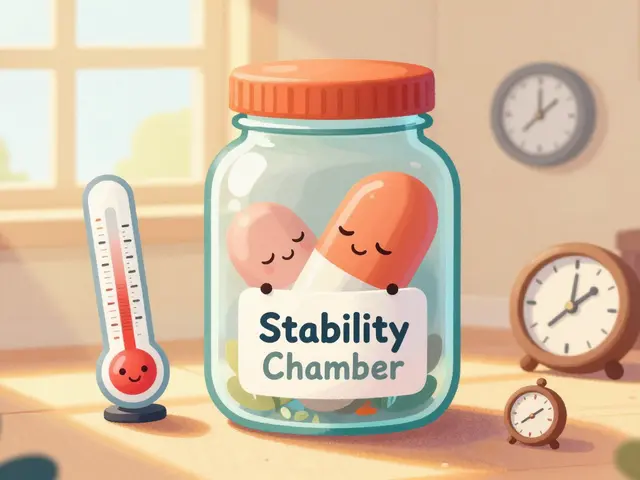Choosing the right medication for dementia can feel like a maze. Exelon is the brand name for Rivastigmine, an oral or transdermal drug that boosts brain chemistry in people with mild‑to‑moderate Alzheimer’s disease or Parkinson’s‑related dementia. In this article we line up Exelon against the most common alternatives - Donepezil, Galantamine, and Memantine - so you can see which one fits your situation best.
Why a comparison matters
Every dementia drug works a little differently, and side‑effects, dosing convenience, and cost vary widely. A clear side‑by‑side view helps patients, carers, and clinicians avoid guesswork and focus on the factors that truly matter: how the drug works, how it’s taken, how often it’s adjusted, and what the typical price looks like in the UK.
Mechanisms of action - what each drug does in the brain
- Rivastigmine (Exelon) is an acetylcholinesterase inhibitor that also blocks butyrylcholinesterase, raising levels of the neurotransmitter acetylcholine.
- Donepezil works solely as an acetylcholinesterase inhibitor, increasing acetylcholine but not affecting butyrylcholinesterase.
- Galantamine combines acetylcholinesterase inhibition with allosteric modulation of nicotinic receptors, giving a double‑boost effect.
- Memantine is an NMDA receptor antagonist. It regulates glutamate activity rather than acetylcholine, making it useful in moderate‑to‑severe stages.
Dosage forms and typical regimens
| Drug | Form | Typical starting dose | Maximum dose | Common side‑effects | Approx. NHS cost per month* |
|---|---|---|---|---|---|
| Rivastigmine (Exelon) | Oral capsule, transdermal patch | 1.5mg BID (capsule) or 4.6mg/24h patch | 6mg BID or 9.5mg/24h patch | Nausea, vomiting, skin irritation (patch) | £30-£45 |
| Donepezil | Oral tablet | 5mg daily | 10mg daily | Diarrhoea, insomnia, muscle cramps | £20-£35 |
| Galantamine | Oral tablet, extended‑release | 4mg BID (tablet) or 8mg daily (XR) | 12mg BID or 24mg daily (XR) | Dizziness, loss of appetite, weight loss | £35-£50 |
| Memantine | Oral tablet, oral solution | 5mg daily | 20mg daily | Headache, constipation, hypertension | £40-£60 |
*Costs are based on the 2025 NHS reference pricing and may vary by pharmacy.
Clinical efficacy - what the studies say
All cholinesterase inhibitors (Rivastigmine, Donepezil, Galantamine) show modest but statistically significant improvements in cognition scores over 6-12 months. A 2023 meta‑analysis found average Mini‑Mental State Examination (MMSE) improvements of 1.5‑2 points across the class.
Memantine, on the other hand, shines in later stages. In the 2024 MEM-MD trial, patients on Memantine plus a cholinesterase inhibitor maintained daily living abilities about 30% longer than those on placebo.
When you compare head‑to‑head trials, the differences among the three cholinesterase inhibitors are small. Choice often hinges on tolerability, dosing convenience, and cost.

Side‑effect profile - what to watch for
Gastro‑intestinal upset is the hallmark of cholinesterase inhibitors. Exelon users often report nausea and vomiting, especially during the titration phase. The patch can cause local skin irritation, which some patients prefer over oral side‑effects.
Donepezil tends to cause insomnia and vivid dreams, while Galantamine may lead to dizziness and loss of appetite. Memantine’s most common complaints are headache and constipation, which many find easier to manage than cholinergic symptoms.
Rare but serious events-such as bradycardia or severe skin reactions-should prompt immediate medical attention regardless of the drug.
Regulatory status and prescribing guidelines
All four medicines are approved by the FDA and the UK MHRA. The National Institute for Health and Care Excellence (NICE) recommends starting with a cholinesterase inhibitor for mild‑to‑moderate Alzheimer’s, adding Memantine only when symptoms progress.
Prescribers in the NHS usually begin with Donepezil or Rivastigmine because of their lower cost, then switch if side‑effects become problematic.
Decision‑making checklist - which drug fits you?
- Stage of disease: Early‑to‑moderate Alzheimer’s - any cholinesterase inhibitor; moderate‑to‑severe - consider Memantine (often combined).
- Administration preference: Patch (Rivastigmine) for those who dislike swallowing pills; daily tablet (Donepezil) for simplicity.
- Side‑effect tolerance: If nausea is a deal‑breaker, try Donepezil or Galantamine; if skin irritation is an issue, avoid the patch.
- Cost considerations: Donepezil is generally cheapest; Memantine can be pricier but may be covered under NHS prescriptions for later stages.
- Drug interactions: All cholinesterase inhibitors can interact with anticholinergic meds; Memantine has fewer cholinergic interactions but can affect blood pressure.

Practical tips for starting and titrating
- Begin at the lowest recommended dose and increase every 2‑4 weeks as tolerated.
- Monitor for gastrointestinal symptoms; prescribing anti‑emetics early can improve adherence.
- For the patch, rotate application sites to reduce skin irritation.
- Schedule a follow‑up MMSE or ADAS‑Cog assessment after 3 months to gauge efficacy.
- If side‑effects outweigh benefits, discuss switching to another cholinesterase inhibitor or adding Memantine.
Key takeaways
- Rivastigmine (Exelon) offers a unique patch option, useful for patients with pill‑swallowing issues.
- Donepezil is the most cost‑effective oral choice with a simple once‑daily regimen.
- Galantamine may provide extra nicotinic benefits but has a higher pill burden.
- Memantine works differently, best reserved for moderate‑to‑severe stages or when cholinesterase inhibitors fail.
- Choosing the right drug hinges on disease stage, side‑effect profile, dosing convenience, and NHS cost coverage.
Frequently Asked Questions
Can I use Exelon and Donepezil together?
No. Both drugs are cholinesterase inhibitors, and combining them doesn’t increase benefit but raises the risk of side‑effects. If one stops working, doctors usually switch to another within the class.
Is the Rivastigmine patch covered by the NHS?
Yes, the NHS provides the 4.6mg/24h and 9.5mg/24h patches for approved indications, though you may need a specialist referral.
What should I do if I get a rash from the patch?
Rotate the patch site each day, keep the skin clean, and apply a thin layer of moisturizer after removal. If the rash persists, contact your GP - they may switch you to oral Rivastigmine or another drug.
How long does it take to see a benefit?
Most patients notice a modest slowing of decline after 6‑8 weeks of stable dosing. The effect plateaus, so regular cognitive checks are essential.
Can Memantine be used alone in early Alzheimer’s?
Guidelines advise Memantine for moderate to severe disease. Using it alone in early stages offers little benefit and isn’t routinely recommended.
Are there any natural alternatives to these drugs?
Lifestyle changes-regular exercise, Mediterranean diet, cognitive training-can support brain health, but they don’t replace prescription meds once dementia is diagnosed.






10 Comments
Stop pushing those pricey meds on everyone.
Look, the patch might save you from choking on pills, but the skin irritation thing is real. NHS pricing shows Exelon sits between Donepezil and Galantamine, so you’re not winning big on cost. If the patient can tolerate a little nausea, start low and titrate slow – that’s the standard route. Remember, the cholinergic side‑effects are class‑wide, so swapping won’t magically erase them. Ultimately, pick the formulation that fits the daily routine.
Oh sure, the government’s secret agenda is to keep us all on cheap cholinesterase inhibitors while the real cure is hidden in the back of a pharmacy shelf. The patch’s skin rash is just a subtle reminder that Big Pharma cares. If you think adding Memantine early will fix everything, you’re living in a fantasy. Their trial data is buried under layers of bureaucracy. Bottom line: the “best” drug is whoever paid the most for the research.
From a pharmacological standpoint, Rivastigmine’s dual inhibition offers a modest advantage in acetylcholine elevation, yet the clinical impact remains comparable to Donepezil.
Indeed, the elegance of a once‑daily tablet can be eclipsed only by the sheer joy of rotating a patch daily – because who doesn’t love a fresh spot of skin irritation?
hey guys, just a heads up – the patch can be a game changer if swallowing pills is a nightmare, but watch out for that rash, it’s no joke.
Managing dementia medication is a tough journey for any family. It helps to focus on small wins each week. Starting with the lowest dose of Rivastigmine can reduce nausea. If the patch causes irritation, rotating sites and using a gentle cleanser often eases the problem. Keep a diary of side‑effects so you can discuss trends with the doctor. Remember that cost differences between Donepezil and Exelon are modest when covered by the NHS. The key is consistency – taking the drug as prescribed without missed days. Regular cognitive assessments after three months give a clear picture of any benefit. Don’t be discouraged if improvements are subtle; stabilization is itself a success. Adding Memantine later can be considered when the disease progresses beyond moderate stages. Always check for drug interactions, especially with anticholinergic medications. Support groups provide emotional relief and practical tips from those who have walked the path. Simple lifestyle changes like regular exercise and a balanced diet complement the medication. Celebrate each day the patient feels more like themselves. You are not alone in navigating these choices and the medical community is there to guide you.
While the succinct summary provided earlier captures the essential pharmacodynamic distinctions, it is worth expanding upon the nuances of receptor affinity and patient‑specific pharmacokinetics. Rivastigmine’s capacity to inhibit both acetylcholinesterase and butyrylcholinesterase may confer a broader cholinergic support, yet the clinical relevance of this dual action remains modest in most trials. Moreover, the transdermal delivery system bypasses first‑pass metabolism, which can be advantageous for patients with hepatic concerns. The trade‑off, however, lies in dermatologic tolerability and adherence to proper patch rotation schedules. From an economic perspective, the NHS pricing framework ensures that cost differentials do not become a barrier for most eligible patients, but individual pharmacy margins can introduce variability. It is prudent to individualize therapy based on side‑effect profiles, comorbidities, and caregiver preferences rather than defaulting to a single agent. Ultimately, shared decision‑making aligns therapeutic goals with the lived experience of the patient and their support network.
Nothing like a good old patch rash to spice up your day :)
Keep pushing forward, you’ve got a whole community cheering you on! 😊